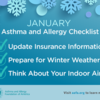Are you making a to-do list for the new year? Add some of these asthma and allergy tasks to your to-do list:
Update Insurance Information
- Give your health care providers your new insurance information. Most doctor’s offices update insurance records each year. Contact your doctor so you can update your insurance information for the year. Doing it now will save you time at future appointments.
- Find out if your medicines are still covered on your prescription plan. Health insurance providers usually update the list of medicines they cover each year. This list is called a formulary. Look for your medicines on your formulary. If they are not covered, let your doctor know as soon as possible. They may be able to change your medicines to ones that are covered by your health plan. If you get those new prescriptions now, you won’t risk scrambling at the last minute to get your new medicines when the old ones run out.
- Update your insurance information with your pharmacy. Just like your doctor, your pharmacy will need your new insurance information so there is no delay when filling your medicines.
Prepare for Winter Weather
- Follow cold weather exercise tips to prevent asthma episodes. Exercising outside in the winter is more likely to trigger asthma symptoms then in warm, humid weather. Before you head out, take steps to keep the colder, drier air from causing symptoms.
- Protect your medicines from the cold. Cold temperatures can make epinephrine and asthma inhalers less effective. Keep them protected during outdoor winter activities and don’t leave them in your car. Use a medicine bag to make them easier to carry with you.
- Make sure you’re ready for an emergency. Do you live in an area that can be affected by winter weather or frequent power outages? If so, make sure you have an emergency plan and supplies before disaster strikes. Have extra medicines, medical supplies, shelf-stable safe food that doesn't need to be cooked, water and supplies readily available in case you lose power or have to evacuate.
Think About Your Indoor Air
- Watch indoor air quality which can get worse in the winter. Cold weather means staying indoors and keeping your home and office closed up more. This can worsen the air quality inside. Be mindful of allergens and triggers that can build up indoors in the winter and work to keep them under control.
It is important to stay up-to-date on news about asthma and allergies. By joining our community and following our blog, you will receive news about research and treatments. Our community also provides an opportunity to connect with other patients who manage these conditions for support.


Comments (0)